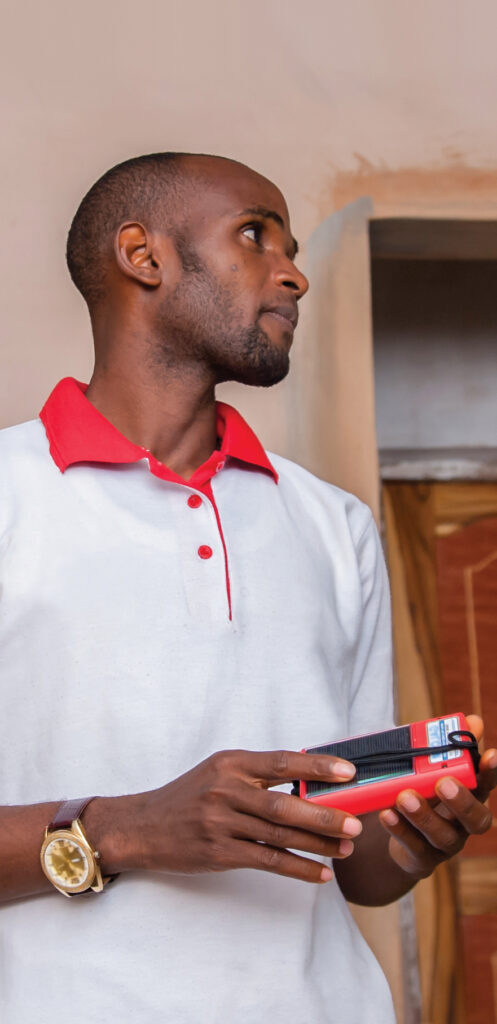Fulani Muslim Dreams About Jesus, Finds Refuge in Christ
Nigeria

A Fulani Muslim’s decision to follow Christ led him from experiencing persecution to helping new Christians grow in faith.
“Turn away from Islam and follow me,” the man in white told him.
When Abel awoke the next morning at his home in Nigeria, he had no idea what the dream meant. And no matter how hard he tried, he could not forget the man in his dream. “The next day, again, it happened to me,” Abel said. “I had that same dream for three days.”
Abel shared the details of the dream with his father and mother, who called it demonic and urged the 28-year-old to recite Muslim prayers to cleanse his mind. He followed their advice, but the dream persisted.

Seeking relief from his anxiety and confusion, Abel decided to tell a Christian friend about the dream. His friend then arranged for Abel to meet a pastor, who told Abel he believed the man in the dream was Jesus. After explaining that Jesus is more than the prophet that Muslims portray him to be, the pastor shared the gospel with Abel.
The pastor’s explanation of the dream angered Abel, who had always been taught that the Bible had been changed and that Jesus was only a prophet. But as he lay awake that night recalling the dream and the pastor’s explanation, he could only think of more questions he had about Jesus.
One night the pastor gave him a Bible, and Abel began to read it on his own. The more he visited the pastor and read the Bible, the more he felt at peace.
Finally, on Dec. 18, 2006, Abel placed his faith in Jesus. Excited about his new faith, he soon shared the news with one of his brothers.
Knowing that Abel could be killed if their fanatical Muslim father found out, his mother advised him to keep it a secret. Few among their Fulani people group are Christian, and those who leave Islam always face persecution, sometimes even death. Abel agreed to keep his Christian faith quiet.
When Abel told the pastor that he had shared the news with his mother, the pastor explained what it meant for him to take up his cross. “There is a high price for the one who follows Jesus,” the pastor told him. “It might cause you to lose your life.”
Taking up the Cross
Eventually, Abel’s father learned of his new faith and immediately called Abel to ask if the news was true. When Abel confirmed his father’s fears, he told him to leave the house. As a proud Fulani Muslim, he could not have a Christian living in his home.
Abel moved to a different city and eventually connected with a VOM-supported training center that provides refuge for Christian converts from Islam. In addition to the fellowship and relative protection he received at the training center, Abel participated in a discipleship program that helped him grow in faith.
Abel’s family, who had learned where he was living, grew increasingly angry about his conversion to Christianity and decided to send one of his brothers, a former classmate, and two other men to kidnap him. The former classmate called him and, pretending that he wanted to catch up, invited him to lunch. During their conversation at a cafe, a van pulled up and the other men jumped out and forced Abel into the van.
The men told him that if he refused to return to Islam, he would pay a price. “I am not going back to Islam,” Abel replied. “Now I am a Christian.”
The men locked Abel in a room, where he received no food except for scraps that his youngest brother was able to sneak to him. After two weeks, another of Abel’s brothers came and ordered him to return to Islam. “I am not going back to Islam, because what I have seen is the truth, and I have made up my mind to stand on that truth,” Abel told him.
His brother then stabbed him several times and began to beat him with rods. But not even torture could persuade Abel to leave Jesus.
His brother eventually left the room, locking the door behind him. But Abel’s mother, heartbroken for her son, sent her daughter to unlock the door and set Abel free.
Growing and Sharing
Abel fled to a smaller city in Nigeria, where he thought he would be safe from his family. After visiting several churches there in hope of finding someone who could help him, a pastor finally agreed to hear his story. The pastor, after a long discussion with Abel, suggested that he stay there and continue discipleship training.
“I went to Bible school to know God more and to be strong in the Lord so that any future challenge like what happened to me would not shake me,” he said.

Later, Abel reconnected with his friends at the training center in the larger city; he realized how much his time there had helped him remain faithful to Jesus throughout the problems with his family. Without it, he said, he would have succumbed not only to persecution from Muslims but also to the temptations and tricks they use to entice new Christians to return to Islam.
“For those who did not pass through the [training center], they don’t stand like this,” he said. “They get money and houses, so when they just talk to them like this, they go back.”
Since 2011, Abel has discipled other Christian converts from Islam at the training center, helping them gain the same unwavering faith that he now has. Because he has overcome many of the same obstacles they have faced, they trust him as they seek to follow the same Jesus who hasn’t left Abel since that first dream.


 Guide
Guide